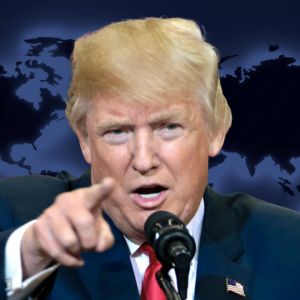President Donald Trump’s new tariffs have created what trade experts are calling a nearly $1 trillion “trade wall” around the U.S. economy. Based on estimates using tariff costs paid in 2024, American big tech companies could face daily expenses ranging from $1 billion to $2 billion. The new tariff policy is set to cost U.S. businesses an estimated $654 billion a year. That figure is projected to grow even further when considering up to an additional $300 billion in tariffs imposed under the International Emergency Economic Powers Act (IEEPA) and Section 232 of the Trade Expansion Act on products like steel, aluminum, and autos. “If this holds up in court, then we are waking up to a new global economy with a different set of costs than we have known for the last several decades,” said Josh Teitelbaum, former Deputy Assistant Secretary of Commerce during the Obama administration. Big tech companies may suffer The U.S. stock market suffered its worst daily loss since 2020 on Thursday. The effects reach beyond Apple in the tech sector. The company has already seen its worst stock drop since the COVID-19 outbreak. While Apple is particularly vulnerable due to its heavy reliance on Asian manufacturing, the new tariff framework puts the entire tech sector’s trade surplus under the microscope. According to Cesar Hidalgo, a professor at the Toulouse School of Economics, tech giants have long benefited from a large trade surplus with the rest of the world. Alphabet exported $141 billion in services, followed by Meta with $71.2 billion, Oracle at $45.2 billion, Amazon at $40.2 billion, IBM at $31.9 billion, and Microsoft at $31.6 billion. Apple stock price. Source: Google Finance. The US exported $2 trillion in physical goods in 2024, while importing around $3.27 trillion. On the surface, this suggests a trade deficit of roughly $1 trillion. However, the digital economy is different. Every time a foreigner streams a movie on Netflix or purchases an ad on Facebook, the United States is effectively exporting its digital services. “We estimate that the U.S. enjoys a trade surplus of at least $600 billion in digital products,” Hidalgo explained. U.S. exports in digital advertising and cloud computing reached about $260 billion and $184 billion, respectively. Hidalgo noted that these figures are even larger than the country’s exports of crude or refined petroleum, which have long been considered one of its major export products. Trade retaliation, however, may not be limited to digital services. Jason Miller, an assistant professor at Michigan State University, warned that massive foreign countermeasures are likely. This means that U.S. exports in tech industries like aerospace, machinery, electrical equipment, computers and electronic products, and energy could all face significant tariff-based retaliation. Could big tech actually benefit from the trade war? The trade war has also raised questions about whether big tech companies could ultimately benefit from the administration’s aggressive tactics. With Wall Street in a state of panic and allies around the globe voicing their displeasure, the fallout from Trump’s trade policies continues to grow. Some of the world’s richest companies might see gains if Trump can successfully negotiate better terms. Issues ranging from the sale of TikTok to digital services taxes, and even Europe’s antitrust actions against Silicon Valley giants, have now become part of the broader trade dispute. Yet the question remains – What exactly does Trump want in exchange for easing these tariffs? Michael Froman, president of the Council on Foreign Relations, addressed the issue on the POLITICO Tech podcast. “Leverage is only good if you take it out for a drive,” Froman said, stressing that the administration must clearly outline what it expects in return from other nations. “You’ve got to be able to lay out for the other countries, for the other markets what it is you want them to change, or do, in order to reduce the tariffs, get rid of the tariffs,” he explained. He noted that, so far, the Trump administration has not provided a detailed plan outlining these demands. Cryptopolitan Academy: Coming Soon - A New Way to Earn Passive Income with DeFi in 2025. Learn More















